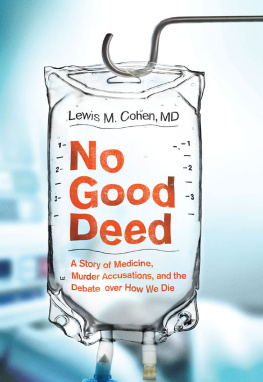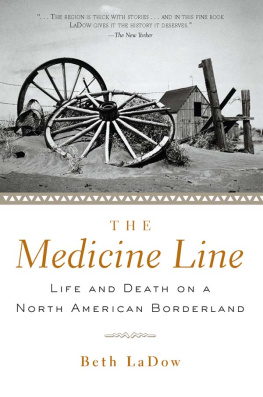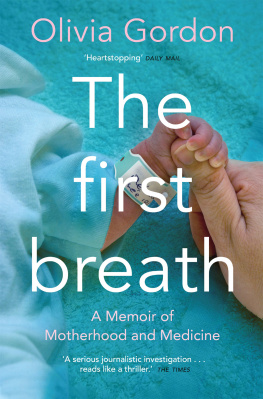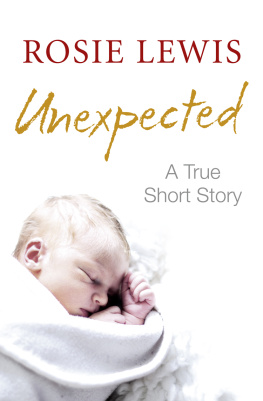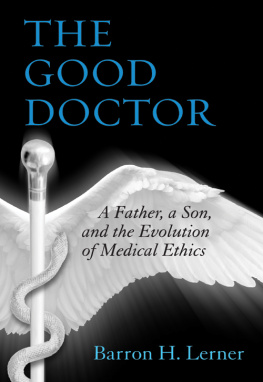This book is dedicated to my loving and insightful wife, Dr. Joan Berzoff,
and our two stalwart sons, Zeke and Jake
No good deed goes unpunished.
A t eight oclock on a blustery Wednesday night in January 2001, two detectives from the state police knocked sharply on the door of Amy Gleasons home. Amy had just returned from a twelve-hour shift at the hospital and was wearily and mechanically preparing her supper. The two men were impressively large, and the atmosphere quickly turned confrontational as they introduced themselves.
The state police were at my front doorso, stupidly, I invited them in, Amy explained to me several years after that fateful day. Since then, Ive learned a hundred things about police detectives. First of all, dont be in a hurry to invite them into your house, and second, you shouldnt go downtown with them when they ask you.
After walking into Amy Gleasons cheerful, cranberry-colored kitchen with its bleached maple cabinets, the two men politely refused to sit down. They quickly glanced around the room before turning their attention back to Amy.
Theres been a death, one of them somberly announced, pausing and leaving a strange emptiness in the air after the word death . The only thing Amy could think was that it must have been someone close to her. Her husband was at work, and she immediately thought of him.
What happened to my husband? she whimpered.
A look of confusion stretched across their faces, and they stared at Amy as if she had two heads.
What do you mean, what happened to your husband? they mumbled back.
Well, you just told me that somebody died! she choked out.
It wasnt your husband, they said.
Instant relief, but suddenly her pulse began to race as she thought about her elderly father.
Did my father die? she gasped, wondering why else the state police would be at her house.
No, they responded, continuing to be vague about why they were now standing in her kitchen. The strange dance of questions and answers went on for a while with Amy still unaware of what had brought these detectives to the house. Towering over her, they asked Amy if she worked at Baystate Medical Center. She confirmed that she was a nurse on Wesson 3, the hospitals renal unit. The detectives then asked if she knew someone named Rosemarie Doherty. Amy gazed at the men blankly for a moment as she tried to remember where she had heard the name.
At first I had no idea who they were talking about, she later recalled when I spoke to her, but then I realized that Rosemarie Doherty was the patient of another nurse, Kim Hoy. Honestly, I had had so little interaction with Mrs. Doherty that I hardly knew her name. I told them, Oh, yes, she passed away.
The two officers looked at her as though waiting for her to fill in the blank that theyd provided.
Does that mean anything to you? they finally asked.
Amy laughed kind of nervously at the question.
Oh, that happens all the time.
Sitting back, years removed from that night, Amy contemplated those words.
Something else Ive learned is that when state police detectives are in your home, another thing not to say is that deaths happen all the time. That is a very, very bad thing to say. But I still did not have a clue as to what they were talking about. Maybe I was just totally naive, but I had no idea they were going to be accusing me of murder.
As Amy was learning what not to say to police officers, her fellow nurse Kim Hoy remained completely ignorant of the furor that would soon envelop her own life. Only after the state police were completely finished interviewing Amy were they going to pay her a visit. During my own subsequent interviews when I asked Kim to tell me about Rosemarie Doherty, I was shocked to watch her usually animated, intimate, and charming self instantly transformed into that of a vulnerable and frightened young woman. My conversations with Kim on this subject were always an emotional roller coaster. Most of the time we smiled at each other as she bubbled along, and then all of a sudden she would metaphorically, or in some instances literally, grab hold of my arm and I would feel as if we were uncontrollably falling. Her account of Rosemarie Dohertys last hospitalization began with one of those horrible descents into despair.
I called her Rosie, she said, waiting a beat to let the name sink in. She was so sick. She had been on dialysis for a while, and was septic, had vascular disease, diabetes, and emphysema. She had a bedsore which we were packing with dressings that took up her whole butt. Both of her heels were necrotic. Basically, she was rotting. Yes, there is no other way to say it. She was rotting.
I had taken care of Rosie off and on, Kim said. During this particular admission to the renal unit, I was her primary nurse for the first part of the week. I had a couple of days off, and then came back for the weekend. There had been active discussion about her becoming a DNR [do not resuscitate]. Although Rosie had periods in which she was more awake and seemingly alert, she was never fully oriented or coherent. Rosie recognized her children during their visits, but otherwise she was not cognizant of what was going on around her. She was terribly uncomfortable, and it was absolutely awful. I returned on the weekend, and the decision had been made during the previous night for her to be DNR and to receive comfort measures only. She would also no longer be going for dialysis treatments.
It was apparent to me that Kim not only cared for this severely ill womans physical problems but also cared for her emotionally. While some staff cant help distancing themselves when a patient is physiologically and cognitively deteriorating, Kim remained tightly connected and committed to Rosie. Kim could not have imagined that her motives and nursing practices would be questioned, and that the police were going to knock on her door, too.
The detectives visits to Kim and Amy had been set in motion several weeks earlier. A nurses aide, Olga Vasquez, had returned home convinced that she had witnessed a monstrous actthere was no doubt in her mind she had seen a woman being murdered.

